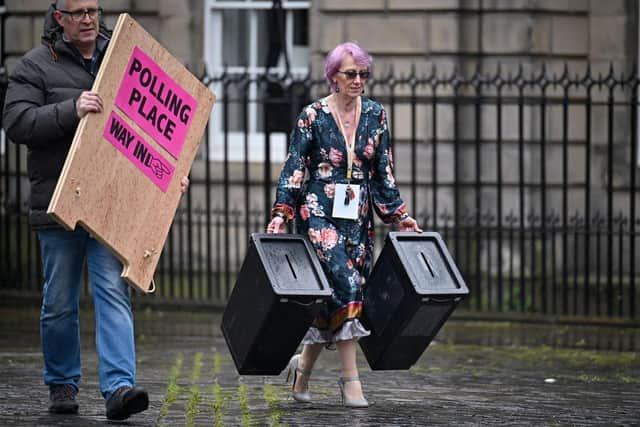Scottish election 2021: Will the SNP win a majority? Seven key questions the Scottish Parliament vote will answer
and live on Freeview channel 276
Here are seven issues the election will clarify for Scottish politics.
Will the SNP win a majority?
Polls throughout the election campaign have placed the SNP on course to win – or narrowly miss out on – a slim Holyrood majority.
Advertisement
Hide AdAdvertisement
Hide AdThe key deciding factor between those outcomes is likely be voter turnout.
If Nicola Sturgeon’s party can get its supporters out in big numbers, seat projects suggest it will take several seats from opposition parties. More than one million people have already signed up for postal votes – a record – which could also have an influence on the result.
Will there be a second independence referendum?


The debate over the timing of a second independence referendum may also well be answered by Thursday’s vote.
If the SNP win a majority, the party will likely plough ahead with its proposal to hold a referendum within the next five years.
Advertisement
Hide AdAdvertisement
Hide AdEven if the party does not win an outright majority, support from the Scottish Greens could still lend credibility to plans for a vote on independence in the life of the next Parliament.
But the job of opposition parties, fighting to prevent a fresh referendum in coming years, will find their job a lot easier if the SNP falls short.


Opposition parties have raised fears of the possibility of a “wildcat” referendum, which could be held without the consent of the Westminster government. However, during Tuesday night’s TV debate, Ms Sturgeon ruled out the possibility of such a poll.
She said: “I would not countenance an illegal referendum – not least because it would not deliver independence.”
Who will form the main opposition?
Advertisement
Hide AdAdvertisement
Hide AdWhile the SNP is almost certain to be the largest party after Thursday’s vote, there is still fierce competition between Scottish Labour and the Scottish Conservatives as to who will take second place.
After years of poor polling, Anas Sarwar’s brief tenure in the top job appears to have boosted Labour’s chances of re-emerging as Scotland’s main opposition party.
The Labour leader has strong approval ratings – far higher than his Tory rival – but the party will have to gain a good handful of seats, rather than simply tread water, if it is to make up the ground it has lost over the past 20 years.
Other pro-independence parties – namely the Scottish Greens, but also potentially Alex Salmond’s Alba party – are set to win seats and could join forces to work with the SNP in what the former first minister has called a “super-majority” – although neither will rival Scottish Labour or the Tories for second place.
What impact will Alba Party have on the result?
Advertisement
Hide AdAdvertisement
Hide AdMr Salmond threw a spanner in the works of the Holyrood election when he launched the all-list Alba Party in March.
Unionists and nationalists alike are wary of the toll Alba could take on seat tallies, but the party insists the electoral arithmetic of backing it, instead of the SNP, will help deliver a “super-majority” of pro-independence parties in the Scottish Parliament.
In principle, the logic makes sense, since the SNP’s dominance in constituency votes means it returns just a handful of regional MSPs – but Ms Sturgeon has warned supporters that splitting their ballot risks letting her party fall short of a majority.
Will Angus Robertson win Edinburgh Central for the SNP?
It was a surprise for everyone when the-then Scottish Tory leader Ruth Davidson was elected MSP for the seat in 2016.
Advertisement
Hide AdAdvertisement
Hide AdHer win was testament to her personal popularity and her appeal to voters who did not normally support her party.
But she is standing down this time and new Tory candidate Scott Douglas does not have a particularly high profile, especially compared to the SNP's Angus Robertson, the party's former Westminster leader.
It was an SNP seat before and the expectation is Mr Robertson will win it back, but the Tories claim they are doing better than expected and predict a close finish. The result is due tomorrow evening.
Could the SNP make a clean sweep in the Capital?
At the moment the SNP holds only three of Edinburgh's six constituencies, with Labour, Tories and Lib Dems having one each. It's the only city with such diverse representation.
Advertisement
Hide AdAdvertisement
Hide AdWith the SNP riding high in the polls, it might look as if it should be able to win all six Capital seats, but Labour-held Edinburgh Southern has a long history of tactical voting, which might well see Daniel Johnson re-elected.
And Lib Dem Alex Cole-Hamilton could benefit from similar support to hold onto Edinburgh Western, which has a strong Lib Dem tradition in any case.
What could the East Lothian result tell us about the bigger picture?
East Lothian has been Labour since the start of the Scottish Parliament, but former leader Iain Gray, the MSP since 2007, is standing down this time and his 1,127 majority is inevitably vulnerable.
Advertisement
Hide AdAdvertisement
Hide AdThe SNP won the Westminster seat in 2015, Labour regained it in 2017 and it went SNP again in 2019. So there has to be a good chance the SNP's Paul McLennan will be the victor here.
But if Martin Whitfield retains the seat for Labour, it would be a signal the party's fortunes have revived at least enough to hold onto traditional strongholds.
A message from the Editor:
Thank you for reading this article. We're more reliant on your support than ever as the shift in consumer habits brought about by coronavirus impacts our advertisers.
If you haven't already, please consider supporting our trusted, fact-checked journalism by taking out a digital subscription.
Comment Guidelines
National World encourages reader discussion on our stories. User feedback, insights and back-and-forth exchanges add a rich layer of context to reporting. Please review our Community Guidelines before commenting.
